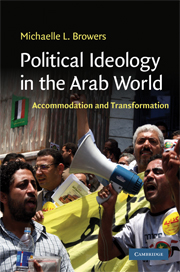Book contents
- Frontmatter
- Contents
- Acknowledgments
- Glossary
- Introduction: Ideological thought and practice in the Arab region
- 1 Retreat from secularism in Arab nationalist and socialist thought
- 2 A more inclusive Islamism? The wasatiyya trend
- 3 Framing a cross-ideological alliance
- 4 The Egyptian Movement for Change: Intellectual antecedents and generational conflicts
- 5 Yemen's Joint Meeting Parties: Origins and architects
- Conclusion: Ideological rapprochement, accommodation, transformation – and their limits
- Bibliography
- Index
- Cambridge Middle East Studies
2 - A more inclusive Islamism? The wasatiyya trend
Published online by Cambridge University Press: 22 January 2010
- Frontmatter
- Contents
- Acknowledgments
- Glossary
- Introduction: Ideological thought and practice in the Arab region
- 1 Retreat from secularism in Arab nationalist and socialist thought
- 2 A more inclusive Islamism? The wasatiyya trend
- 3 Framing a cross-ideological alliance
- 4 The Egyptian Movement for Change: Intellectual antecedents and generational conflicts
- 5 Yemen's Joint Meeting Parties: Origins and architects
- Conclusion: Ideological rapprochement, accommodation, transformation – and their limits
- Bibliography
- Index
- Cambridge Middle East Studies
Summary
Just as the failure of Arab nationalist regimes in the Arab–Israeli wars accounts for some of the transformations among leftist and Arab nationalist intellectuals, so too one might identify an historic event that lent particular urgency to the development of a moderate trend in Islam: the assassination of Egyptian president Anwar Sadat by the Islamic Jihad group in October 1981. Many of the leading theorists of the Islamic revival (al-sahwa al-islamiyya) sought to distinguish their position from the political turmoil engulfing the country and from the extremist forces that contributed to its emergence. In doing so, they began articulating principles that have been characterized as moderate or centrist (wasatiyya). Other scholars have called these individuals “the new Islamists” and emphasize their focus on intellectual activity rather than on political organizing. The Islamist movement has been criticized for the dearth and lack of specificity of political thought coming out of their movement. In many ways, these individuals fill that intellectual vacuum in Islamist discourse.
The individuals associated with this trend consist primarily of Egyptian Islamists – such as Muhammad al-Ghazali (1917–1996), Yusuf al-Qaradawi (b. 1926), Fahmi Huwaydi (b. 1936), Kamal Abu al-Majd (b. 1930), Muhammad al-'Imara (b. 1931), and Muhammad Salim al-'Awa (b. 1942). However, at least one Egyptian Copt, Rafiq Habib (b. 1959), espouses similar ideas and has aligned himself politically with ideas and thinkers characterized as wasatiyya, and the influence of many of these figures extends far beyond Egypt.
- Type
- Chapter
- Information
- Political Ideology in the Arab WorldAccommodation and Transformation, pp. 48 - 76Publisher: Cambridge University PressPrint publication year: 2009



